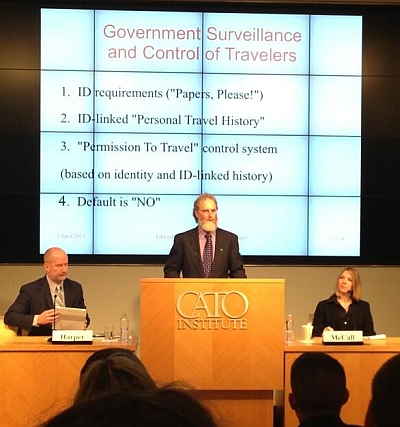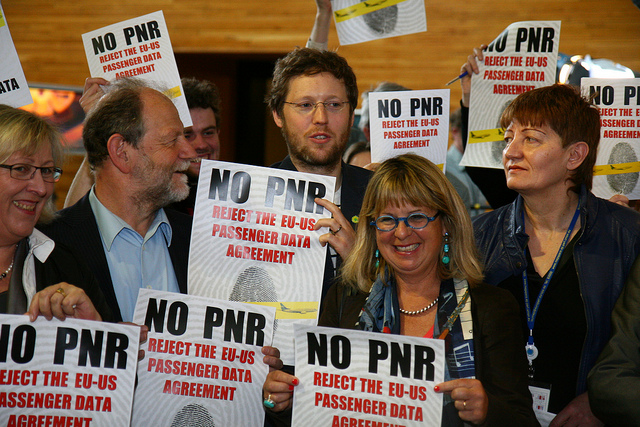TSA proposes arbitrarily individualized surveillance-based searches
In the latest version of TSA’s endless series of “trusted traveler” (or “less mistrusted traveler”) schemes, the agency is currently proposing to impose more intrusive searches on any traveler who doesn’t “voluntarily” enroll in the TSA Pre-Check program and authorize the TSA to create a new permanent file with everything from your fingerprints to any “other information provided by … government agencies or other entities”.
These files would be exempted from the normal requirements of the Privacy Act that records used as the basis for decisions about individuals’ exercise of our rights be made available to us and be limited to information that is sufficiently accurate, complete, and relevant to form a legitimate basis for such decisions.
The proposal is contained in a package of three regulatory filings (one new and one revised “System of Records Notice” and a “Notice of Proposed Rulemaking” proposing Privacy Act exemptions) published last month in the Federal Register. All three have to be read in combination to appreciate their full implications.
The deadline for public comments on two of these proposals is today, and for the third is tomorrow. We filed consolidated comments today objecting to all three of these proposals:
Read in combination, this new and revised SORN and these proposed regulations describe a system in which an essentially unlimited range of personal information collected from an essentially unlimited range of sources, and known to include inaccurate and irrelevant information, would be (or perhaps already is being) compiled into the “TSA Pre-Check Application Program” system of records.
These records would be used – either according to criteria which are illegally being kept secret, or in an entirely arbitrary manner at the “discretion” of the TSA – to determine who is and who is not deemed “eligible” to exercise the right to travel without being subject to unreasonable searches.
The results of that decision-making would be incorporated into the “Secure Flight” system of records, and used as part of the basis (also either pursuant to secret rules or entirely arbitrarily) for deciding to issue or withhold the issuance of individualized “boarding pass printing results”, including instructions to TSA staff and contractors as to the degree of intrusiveness of the search to which each would-be traveler is to be subjected as a condition of exercising our right to travel.
Maintenance and use of these systems of records in the manner contemplated by these SORNs and the proposed exemptions would violate the 1st, 4th, and 5th Amendments to the U.S. Constitution, the presumption of innocence, due process, the Freedom Of Information Act (FOIA), the Privacy Act, and Article 12 (Freedom of Movement) of the International Covenant on Civil and Political Rights (ICCPR.
These records should be expunged, and the proposed regulations should be withdrawn….
We also point out that the TSA is only pretending to give the required consideration to public comments:
According to the “TSA Pre-Check Application Program” SORN published on September 10, 2013, “The Secretary of Homeland Security has exempted certain records from this system from the notification, access, and amendment procedures of the Privacy Act because it may contain records or information related to law enforcement or national security purposes.”
This claim was, and is, false. As of the date of the SORN, no such exemption had even been proposed: the NPRM proposing such an exemption, and requesting public comments (such as this one) concerning that proposed exemption for consideration by the DHS, was not published until a day later, on September 11, 2013. Even now, the Secretary has promulgated no final rule for such an exemption. Nor could he or she promulgate any such final rule, consistent with the Administrative Procedure Act, unless and until the current period for public comment on the proposed exemption rule has concluded and the comments submitted (including these comments) have been considered by the DHS.
The false claim that “The Secretary of Homeland Security has exempted certain records from this system from the notification, access, and amendment procedures of the Privacy Act”, when in fact the Secretary has not done so, appears to be intended to mislead individuals about what rights we have, and to dissuade us from attempting to exercise our rights. In addition, by stating the outcome of the current exemption rulemaking as a fait accompli, it constitutes prima facie evidence of bad faith in the consideration of public comments. It is not enough for an agency to accept submissions of comments from the public to the circular file, after making a decision. An agency must give genuine consideration to public comments before deciding whether to finalize, modify, or withdraw a proposed rule.
You can read our complete comments here. You can submit comments at Regulations gov (here, here , and here) but your comments won’t be processed or visible online until after the DHS Privacy Office re-opens.
[TSA Pre-Crime graphic from Leaksource]


